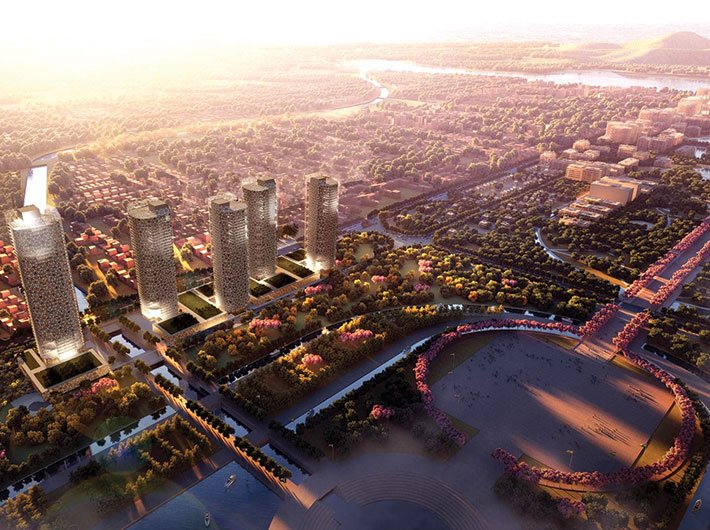Andhra farmers are exploring the opportunities of how best they can develop their land based on what they saw and learnt in Singapore
Farmers from villages of Amaravati are visiting Singapore for an on-the-ground study of developmental programmes there. They have an opportunity to see how land bought from them by the Andhra Pradesh government will be used for the development of the upcoming state capital, Amaravati, and also how they can invest the wealth they have acquired after parting with their land. Farmers who handed over their land for the upcoming planned city got 27 percent of their land back. And now these farmers are exploring the opportunities of how best they can develop their plot of land in their village in Amaravati based on what they saw and learnt in Singapore. Their foreign visit is facilitated by the Andhra Pradesh capital region development authority (CRDA), which is building the new city. Around 26,000 farmers gave up around 33,000 acres of land for development of state’s new capital Amaravati along the Krishna river. Governance Now spoke with the man in charge of the capital city project, CRDA chairman Sreedhar Cherukuri, on phone.
The initiative to take farmers to abroad was quite unusual. Why did you choose Singapore?
Singapore is the partner in the development of Amaravati. Singapore has contributed from the day one of the city planning. We have entered into an MoU with Singapore government, and we feel Singapore is the right model to adapt. It is considered one of the most liveable cities in the world and has created its own mark in the world economy. Also, its similarity to the weather conditions of Amaravati made us chose Singapore for farmers visit.
Can you tell us more about the initiative?
It is an exposure visit. The AP government has done land procurement under a land pooling scheme to build the capital city Amaravati. In this almost 24,000 farmers are partners of development of capital region, meaning these many farmers parted with their land for construction of Amaravati.
So we thought as we construct the city, farmers should also have exposure to best practices that are happening around the world. For this we thought Singapore would be the best place to see.
Two batches of 34 farmers each went for four days. The first batch left almost two months ago and the second on December 2. There will be a third batch, leaving around December 24 and one last batch in January. A total of 123 farmers are part of the trip.
As part of the exposure visit the farmers are visiting various places in Singapore where development is taking place. For example, the Singapore government’s Centre for Liveable Cities, which has showcased how a small fishing village has developed in the last 50 years and rose to a global city. There, the farmers got to know about the entire development process. They got the opportunity to interact with local planners. They also saw various other developments like housing projects, commercial projects, how they have developed their green spaces, how the road system is built, how they built their solid waste management system. The farmers were also taken to Universal Studios, and they were told about the tourism industry’s importance in the Singapore economy, and how Singapore has nurtured the sector over a period of time.
Meetings of farmers with representatives of the Singapore government were also arranged.
Language is not a barrier for the farmers during the visit. One officer accompanies them. Also, there are a lot of Telugu-speaking people in Singapore, including some employees of the Singapore government.
What is the idea behind the initiative?
As part of the development partnership with the state government, farmers who parted with their land for development of Amaravati got 27 percent of it back. The farmers are planning to develop this land. There are around 12,000 acres of land with the farmers, and the tour to Singapore aims to give them an opportunity to develop their land, and also help them understand how the cities are planned and how cities get the right infrastructure. The tour is a part of the Farmers First initiative of the state government.
Two batches have already completed their trip. What is their feedback, are they thinking of developing their land based on what they have seen?
Farmers are exploring a lot of opportunities. Once the entire programme is over the Singapore government is facilitating a visit of various developers to Amaravati. These developers would help farmers develop their plot of land.
Will the state government offer further help to the farmers?
Yes. We initiated a project called Farmers First. Through this we are building a farmers support system wherein we are engaging best people from various fields such as real estate consultants, developers consultants and financial consultants. These people would provide support to the farmers. If they want to develop their land this support system would facilitate the farmers in getting the right people, bringing institutional finance to them, also providing them market understanding.
Has any other state approached AP to replicate this initiative?
The Yamuna expressway authority approached us. Even Maharashtra, Gujarat, Odisha and Jharkhand are studying our model.
Around 26,000 farmers have given their land. How did you select 123 farmers for the Singapore trip?
Once we had decided on the programme we had placed an open advertisement, inviting all farmers to apply. Initially we thought we would be sending 100 people but we got the applications from 123. So we thought as they are showing interest we should send all of them.
What is the cost borne by the state government?
AP in partnership with the Singapore government has spent Rs 40 lakh on farmers’ tour plan, hotel stay and food in Singapore. Farmers are paying for the ticket as they have become rich after receiving compensation for their land! n
shivani@governancenow.com
(The interview appears in the January 15, 2018 issue)
